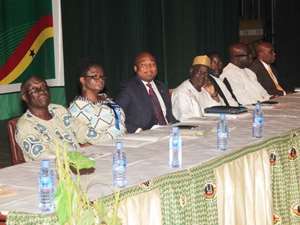
Ablakwa (3rd left) with Alhaji Imoro (4 th left) at the forum
A Deputy Minister for Education in charge of Tertiary, Samuel Okudzeto Ablakwa, has disclosed that the National Service Law (Act 426, 1980) is being reviewed to ensure that service personnel undergo compulsory military training.
According to the Minister, a committee had been set up to look at the law and recommend portions that need amendment.
Mr. Ablakwa, who made this known at the 14th stakeholders' conference of the National Service Scheme in Accra said, 'It is time for national discourse on the compulsory military training for service personnel. Ghana stands to benefit if we are able to make it work.'
'It is important that we consider this compulsory military training. Even if it cannot be done within the two-year period as it had originally been envisaged by the 1980 Act, if it can be done within six months or three months of the one year, it will be helpful,' he said.
A careful look at the Act 426 indicates that some provisions have not been followed to the letter for about 34 years,' Mr. Ablakwa said.
The Deputy Minister said per the Service Act, the national service must be done within a two-year period, but the one-year programme was currently being adhere to.
Mr. Ablakwa said the percentage of service personnel allocated to private sector was too small and called for an increase.
He said the private sector only receives five to 10 percent of the service personnel, stating that 'this is small and disproportionate.'
Mr. Ablakwa called for an entrepreneurial model to be added to the programme to support graduates who undertake national service.
Reducing Unemployment
Alhaji Alhassan Imoro, Executive Director of the Ghana National Service Scheme (GNSS), in his address, said the Scheme had engaged stakeholders and user agencies to find ways of reducing graduate unemployment in the country.
He said the unemployment rate had become alarming in the country.
Alhji Imoro said the challenge has been the inability of these young graduates to create their own jobs.
According to him, the nature of the courses offered by the various universities and the polytechnics leave these young graduates without any practical skills and innovative ideas in the world of business, and this makes it very difficult for them to fit in the fast technological advanced job market.
As a result, he said, these young graduates, without the required practical knowledge and skills, search for the few jobs in the market whereas the majority do not qualify for many jobs due to the lack of experience.
Alhaji Imoro said the Scheme has taken steps to improve the entrepreneurial skills of these young graduates so that they could create their own jobs and other business ventures in the outside world.
The National Service Scheme, since its inception in 1973, has deployed about 80,000 national service personnel to serve in the various sectors of the country's economy.
By Cephas Larbi
[email protected]




 April 20: Cedi sells at GHS13.63 to $1, GHS13.06 on BoG interbank
April 20: Cedi sells at GHS13.63 to $1, GHS13.06 on BoG interbank
 Dumsor: I'm very disappointed in you for messing up the energy sector — Kofi Asa...
Dumsor: I'm very disappointed in you for messing up the energy sector — Kofi Asa...
 Dumsor: Instruct ECG MD to issue timetable and fire him for lying — Kofi Asare t...
Dumsor: Instruct ECG MD to issue timetable and fire him for lying — Kofi Asare t...
 Ashanti region: Road Minister cuts sod for 24km Pakyi No.2 to Antoakrom road con...
Ashanti region: Road Minister cuts sod for 24km Pakyi No.2 to Antoakrom road con...
 Train crash: ‘How could any normal person leave a car on rail tracks?’ — Frankli...
Train crash: ‘How could any normal person leave a car on rail tracks?’ — Frankli...
 Train crash: Driver of abandoned vehicle not our branch chairman nor secretary —...
Train crash: Driver of abandoned vehicle not our branch chairman nor secretary —...
 Kenya pays military homage to army chief killed in copter crash
Kenya pays military homage to army chief killed in copter crash
 US agrees to pull troops from key drone host Niger: officials
US agrees to pull troops from key drone host Niger: officials
 Mahama vows to scrap teacher licensure exams, review Free SHS policy
Mahama vows to scrap teacher licensure exams, review Free SHS policy
 Government will replace burnt Madina shops with a new three-story, 120-store fac...
Government will replace burnt Madina shops with a new three-story, 120-store fac...
